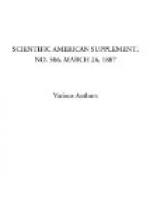Once, while on a scientific excursion on the great plains, with the lamented Prof. Mudge, he nearly lost his life. He had captured a rattlesnake, and, in trying to introduce it into a jar filled with alcohol, the snake managed to bite him on the hand. The arm was immediately bound tightly with a handkerchief, and the wound enlarged with a pocket knife, and both professors took turns in sucking it as clean as possible, and ejecting the poison from their mouths. This and a heavy dose of spirits brought the professor through in safety, although the poison remaining in the wound caused considerable swelling and pain in the hand and arm. When this incident was mentioned in the Kansas Academy of Science that year, some one said, “Now we know the effect of the bite of the prairie rattlesnake on the human system. Let some one, in the interests of pure science, try the effect of the timber rattlesnake on the human system.” But like the mice in the fable, no one was found who cared to put the bell on the cat.
Professors Mudge and Snow, because scientists were so few in the State at that early day, divided the field of natural science between themselves, the former taking geology and the latter living forms. Professor Mudge built up at the agricultural college a royal cabinet, easily worth $10,000, and Professor Snow has made a collection at the State University whose value cannot be readily estimated until it is catalogued and placed in cases in Snow Hall.
As a scientist, Professor Snow is an indefatigable worker, conscientious and painstaking to the last degree, never neglecting anything that can be discovered by the microscope, and when he describes and names a new species, he gives the absolute facts, without regard to theories or philosophies. For accuracy his descriptions of animal and vegetable life resemble photographs, and are received by scientists with unquestioned authority. He possesses another quality, which may be called honesty. Some scientists, whose reputation has reached other continents, cannot be trusted alone in the cabinet with the keys, for they are liable to borrow valuable specimens, and forget afterward to return them.
It is possible only to glance at the immense amount of work performed by Professor Snow during the last twenty years. Neglecting the small fry that can only be taken in nets with very fine meshes, he ascertained that there are twenty-seven species of fish in the Kansas River at Lawrence. Work on this paper occupied the leisure time of two summers, as much time in such investigations only produces negative results. For several years he worked on a catalogue of the birds of Kansas, inspiring several persons in different parts of the State to assist him. Later this work was turned over to Colonel N.S. Gross, of Topeka, an enthusiast in ornithology. Colonel Goss has a very fine collection of mounted birds in the capitol building at Topeka, and he has recently published




